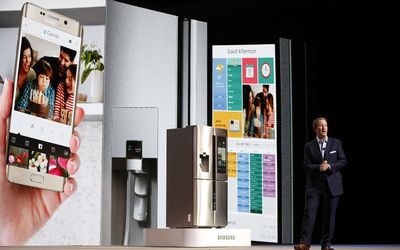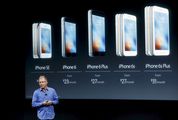Internet fridge comes in from the cold
by Tim Bradshaw,
2016-01-12 06:05:06.0
RIDING a huge tech boom, one of the world’s largest consumer electronics companies pitches a radical idea: a refrigerator that "thinks", connected to the internet, with its own screen for sending messages and ordering food.
"It will revolutionise daily life," claims its manufacturer. "The intelligent refrigerator is here."
As it turned out, that claim was a little premature. The year was 1999 and Electrolux’s Screenfridge did not spark a revolution. A year later, the Nasdaq hit its dotcom peak and the rest is history. Now the boom is back and so is the thinking fridge.
Samsung took to the stage at the Consumer Electronics Show last week to declare — in strangely familiar language — that it has invented a "brand new refrigeration category". Its Family Hub refrigerator is a "sophisticated multitasker that reconnects families, organises groceries and home tasks, and provides entertainment".
Either we are finally living in the future, or the end of the current tech cycle must be nigh. The internet fridge has been a running joke for years at the Consumer Electronics Show. "Consumer electronics companies seem to have been obsessed with the concept of an internet-enabled fridge throughout the last decade," says Ben Wood, analyst at CCS Insight.
The most notable recent example at the annual Las Vegas gadget show was two years ago, when LG showed off appliances featuring "HomeChat", allowing owners to send messages to the fridge via chat app Line. I mocked it — who wants to send cartoony "stickers" to their kitchen storage? — but the idea that more of our utilitarian or transactional conversations would move to chat apps is thriving, as witnessed by Facebook Messenger and its ambitious virtual assistant M.
Even if the concept of an internet fridge remains a little ludicrous, sometimes trying out new technology in odd places can produce genuinely smart ideas.
So perhaps Samsung’s latest is worth a second look too. First off, it takes selfies — that is, each time you close the door, the fridge snaps a pic of its contents. That this can be viewed on a screen on the very same door is not much of a time saver. But the ability to check whether you are out of milk from your phone when you are on the bus home does have appeal.
Samsung is not the only appliance maker putting cameras in the cooler: Bosch and Siemens are at it too. And many are putting screens on the fridge too.
Samsung’s Family Hub has a 21.5-inch LCD touchscreen that displays, yes, messages from family members and recipes, but also the weather, internet radio and — if you have a Samsung television — what you were watching in the other room before deciding to make tea.
Might this be the dawn of the "internet of occasionally useful things"?
The problem with Samsung’s internet fridge is, well, it is a fridge. People do not buy fridges very often and when they do, they will weigh whether the Family Hub is worth the several thousand dollars it is expected to cost.
Fortunately, the same momentum that is putting cameras and screens in every appliance is also driving down the costs of that technology everywhere else. You can buy the individual parts of an internet fridge without having to go all the way. For instance, Smarter, a British start-up that last year made an internet-connected kettle, will soon be selling a standalone fridge camera for about $100. At about $50, decent quality tablets such as Amazon’s Fire are now so affordable that you could leave one permanently attached to your fridge, if you really want to leave digital Post-its for the kids.
And that is the truly brilliant thing about the technology industry. Ideas that were too expensive to be given the benefit of the doubt 15 years ago are now so cheap that they feel less silly.
The internet fridge of the future is finally here. You just don’t have to buy it all at once.
(c) The Financial Times Limited 2016

John Herrington, senior vice-president of Samsung Electronics America, unveils the Family Hub refrigerator during an event at the Consumer Electronics Show in Las Vegas last week. Picture: BLOOMBERG/PATRICK T FALLON
RIDING a huge tech boom, one of the world’s largest consumer electronics companies pitches a radical idea: a refrigerator that "thinks", connected to the internet, with its own screen for sending messages and ordering food.
"It will revolutionise daily life," claims its manufacturer. "The intelligent refrigerator is here."
As it turned out, that claim was a little premature. The year was 1999 and Electrolux’s Screenfridge did not spark a revolution. A year later, the Nasdaq hit its dotcom peak and the rest is history. Now the boom is back and so is the thinking fridge.
Samsung took to the stage at the Consumer Electronics Show last week to declare — in strangely familiar language — that it has invented a "brand new refrigeration category". Its Family Hub refrigerator is a "sophisticated multitasker that reconnects families, organises groceries and home tasks, and provides entertainment".
Either we are finally living in the future, or the end of the current tech cycle must be nigh. The internet fridge has been a running joke for years at the Consumer Electronics Show. "Consumer electronics companies seem to have been obsessed with the concept of an internet-enabled fridge throughout the last decade," says Ben Wood, analyst at CCS Insight.
The most notable recent example at the annual Las Vegas gadget show was two years ago, when LG showed off appliances featuring "HomeChat", allowing owners to send messages to the fridge via chat app Line. I mocked it — who wants to send cartoony "stickers" to their kitchen storage? — but the idea that more of our utilitarian or transactional conversations would move to chat apps is thriving, as witnessed by Facebook Messenger and its ambitious virtual assistant M.
Even if the concept of an internet fridge remains a little ludicrous, sometimes trying out new technology in odd places can produce genuinely smart ideas.
So perhaps Samsung’s latest is worth a second look too. First off, it takes selfies — that is, each time you close the door, the fridge snaps a pic of its contents. That this can be viewed on a screen on the very same door is not much of a time saver. But the ability to check whether you are out of milk from your phone when you are on the bus home does have appeal.
Samsung is not the only appliance maker putting cameras in the cooler: Bosch and Siemens are at it too. And many are putting screens on the fridge too.
Samsung’s Family Hub has a 21.5-inch LCD touchscreen that displays, yes, messages from family members and recipes, but also the weather, internet radio and — if you have a Samsung television — what you were watching in the other room before deciding to make tea.
Might this be the dawn of the "internet of occasionally useful things"?
The problem with Samsung’s internet fridge is, well, it is a fridge. People do not buy fridges very often and when they do, they will weigh whether the Family Hub is worth the several thousand dollars it is expected to cost.
Fortunately, the same momentum that is putting cameras and screens in every appliance is also driving down the costs of that technology everywhere else. You can buy the individual parts of an internet fridge without having to go all the way. For instance, Smarter, a British start-up that last year made an internet-connected kettle, will soon be selling a standalone fridge camera for about $100. At about $50, decent quality tablets such as Amazon’s Fire are now so affordable that you could leave one permanently attached to your fridge, if you really want to leave digital Post-its for the kids.
And that is the truly brilliant thing about the technology industry. Ideas that were too expensive to be given the benefit of the doubt 15 years ago are now so cheap that they feel less silly.
The internet fridge of the future is finally here. You just don’t have to buy it all at once.
(c) The Financial Times Limited 2016




















Change: 1.19%
Change: 1.36%
Change: 2.19%
Change: 1.49%
Change: -0.77%
Data supplied by Profile Data
Change: -0.08%
Change: 0.12%
Change: 1.19%
Change: 0.00%
Change: 0.10%
Data supplied by Profile Data
Change: 0.32%
Change: 0.38%
Change: 0.36%
Change: 0.22%
Change: 0.23%
Data supplied by Profile Data
Change: -0.02%
Change: -0.51%
Change: -0.19%
Change: -0.33%
Change: -0.15%
Data supplied by Profile Data